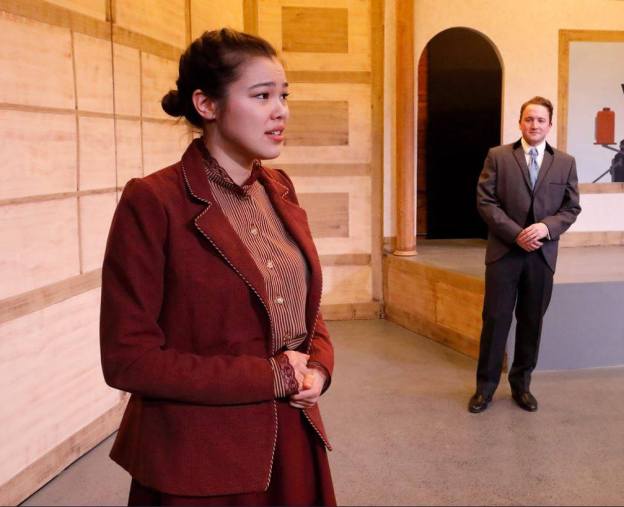Lucy Vogue and Aidan Thomas in Blue Stockings. Photo: Scott Henderson, Henderson Images.
Blue Stockings is set at the University of Cambridge, in 1896, and mostly at Girton, a women’s college of the university. It follows a study group of four young women in their first year at the college, Tess (Lucy Vogue), Carolyn (Monica Lefurgey), Celia (Jocelyn Jay), and Maeve (Maggie Salopek), showing their passion for learning science, their struggles with learning to disagree with sources and defend their ideas, and their commitment to future careers in teaching, research, and medicine. The play also shows how they are treated by faculty male and female, by their male peers, and by College staff including a chaperone (Julie Sinclair) and a maid willing to circumvent the chaperone (Rebecca Collins).
I was pleased to see the way the script touched on many issues of women’s education which were not black-and-white. The male faculty’s attitudes ranged from enthusiastically supportive (Dave Wolkowski as physics lecturer) to pseudoscientifically condescending (Martin Stout as renowned psychiatrist). The head of the women’s college (Elizabeth Marsh) is single-minded in her attempts to gain degree-seeking status for the young women through the university Senate and vote of members. This cause drives her to disavow any connection with the too-radical suffragist cause and to expel a student who is needed at home because letting her stay might be used as a demonstration that women’s education hurts families. The students also sometimes find themselves torn between their passion for study and the temptations of romance, with significant consequences.
Director Laura Ly used a cast of 19 to portray the 25 characters, and set designer Alan Westen used rotating backdrops and moving furniture to present various university settings.
If, like myself, you learned about the history of women’s university education in England through Dorothy Sayers’ wonderful 1935 novel Gaudy Night, you may be unsurprised by the women’s constant need to justify their presence, but surprised by some of the history. Gaudy Night is set at Oxford rather than Cambridge, which explains the main difference.
Blue Stockings plays at the Walterdale Theatre until Saturday April 14th, including a matinee today. Advance tickets are at Tix on the Square and same-day tickets are at the door.

